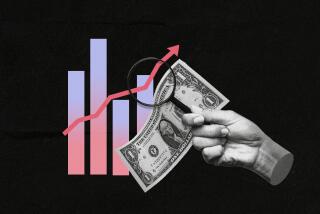Americans See Drop in Their Net Worth
- Share via
WASHINGTON — The net worth of U.S. households, hurt by a falling stock market, declined by 2% last year, the first annual setback in Americans’ balance sheets in 55 years.
The Federal Reserve said Tuesday that Americans’ total net worth was $41.42 trillion at the end of last year, a drop of $841.5 billion from their net worth at the end of 1999.
It marked the first time that Americans’ net worth had declined from one year to the next since the Fed began tracking the figures in 1945.
The decline followed five straight years of strong increases in net worth as individual wealth was driven higher by the booming stock market. Household net worth rose by 12.6% in 1997, 10% in 1998 and 14.1% in 1999.
Private economists said Tuesday that the new Fed figures, contained in a report titled “Flow of Funds Accounts of the United States,” went a long way in explaining the economy’s current weakness.
“The bursting of the stock market bubble has eroded household balance sheets and undermined the willingness and ability of Americans to spend as aggressively as they had been spending,” said Mark Zandi, an economist at Economy.com, a West Chester, Pa., consulting firm.
Consumer spending, a major driving force during the record 10-year economic expansion, has been supported in recent years by what economists called the “wealth effect,” the fact that consumers were more willing to spend as their investment portfolios rose in value.
Zandi said the drop in the stock market last year and the continued decline this year was triggering a negative wealth effect, in which consumers cut back on spending and save more as they see their portfolios shrink.
“The negative wealth effect is probably greater than the positive wealth effect because individuals now realize they will have to work harder and spend less to be able to finance the kinds of things, such as retirement, that they were counting on in the future,” Zandi said.
The Fed report showed that household ownership of stocks, either directly or indirectly in mutual funds and private pension plans, fell by 17.6% last year to $11.55 trillion, a loss of $2.47 trillion from the previous year.
Part of that decline was offset by gains in other assets held by households, including homes and other real estate.
The Fed’s balance-sheet report combines households and nonprofit organizations. Nonprofit organizations accounted for only about 6% of total financial assets.
More to Read
Inside the business of entertainment
The Wide Shot brings you news, analysis and insights on everything from streaming wars to production — and what it all means for the future.
You may occasionally receive promotional content from the Los Angeles Times.










